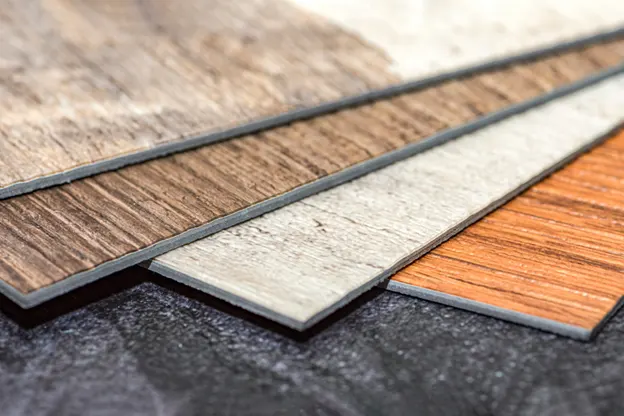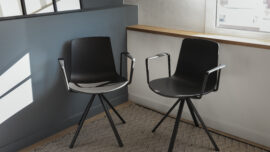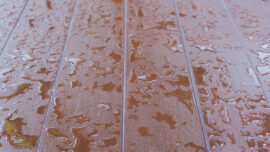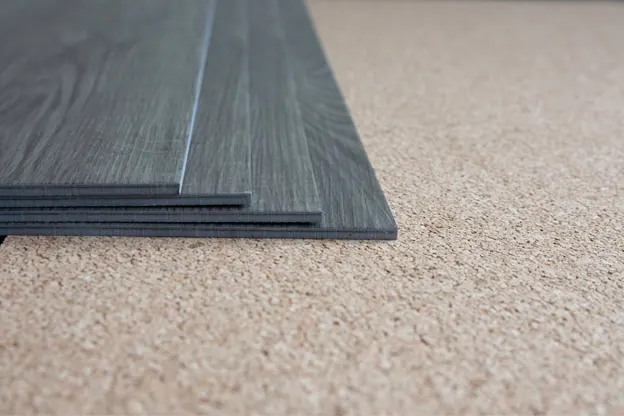
Vinyl Flooring Showdown: LVT vs LVP Flooring
Last Updated on December 30, 2023 by Jeff Cappon
It’s time to make a decision. You have been eyeing your options and researching the different kinds, but now you are faced with making the choice. Which one is for you?
Luxury Vinyl Tile (LVT) and Luxury Vinyl Plank (LVP) are two different kinds of luxury vinyl flooring. To help you decide which is right for you, we’ll go over the features and qualities of each, including:
- Appearance
- Waterproofing
- Installation
- Care and Cleaning
- Durability and Maintenance
- Lifespan
And we’ll also give you a recap of the pros and cons of luxury vinyl flooring! To start, let’s get into what each one is.
LVT vs LVP: What Is The Difference?
While they may sound similar, they actually do have some differences.
Luxury Vinyl Tile
LVT is made up of tiles that are cut to size and fit together like a puzzle. The tile is then adhered to the floor using an adhesive. LVT can be made to look like stone, ceramic, or wood.
Luxury Vinyl Plank
Luxury vinyl plank (LVP) is made up of long, thin strips of vinyl that mimic the look of hardwood floors. The planks are cut to size and fit together using a tongue-and-groove system.
Now that we know what each one is, let’s take a closer look at their features!
LVT vs LVP: The Appearances
As we mentioned before, LVT and LVP can both be made to look like stone, ceramic, or wood.
Luxury Vinyl Tile
LVT is available in a wide variety of colors and patterns. You can find LVT that looks like marble, granite, limestone, slate, and more. It is also available in a variety of wood looks, including oak, walnut, cherry, and more. The most popular colors include shades of brown, gray, and white.
Luxury Vinyl Plank
LVP is also available in a wide variety of colors and patterns. You can find LVP that looks like hardwood floors, bamboo floors, and more. The most popular colors also include shades of brown, gray, and white.
So, what’s the difference in appearance?
When it comes to appearances, LVT and LVP are very similar. Both can be made to look like a variety of different flooring materials. They both can achieve the same general look you’re going for. The only difference is in the shape, and therefore the installation process (which we will get into later).
LVT vs LVP: Waterproofing
One of the main reasons people choose luxury vinyl tile or plank is because it is very water-resistant.
Both LVT and LVP are 100% waterproof, as they are constructed of sturdy layers of plastic. They’re especially ideal for kitchens and bathrooms that have a tendency to be exposed to moisture.
The level of waterproofing to your flooring is an important factor to consider if you live in an area that is prone to excess moisture or flooding, or if you have young children or pets who may have accidents.
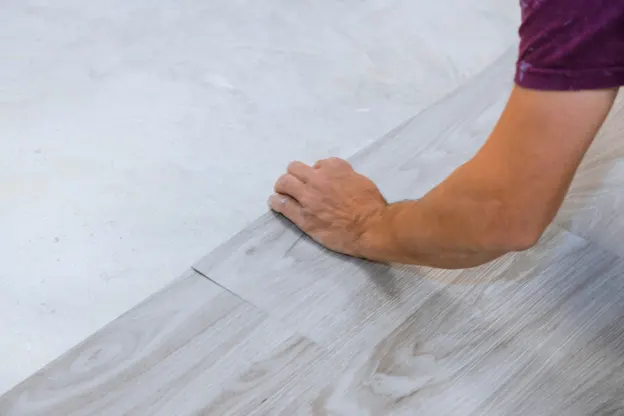
LVT vs LVP: Installation
Luxury vinyl tile and plank are both very easy to install. Both can be “floated” over existing hard flooring, making the process easier than having to remove the flooring and start from scratch (though in some cases with different levels of flooring, adjustments may be needed). However, we do suggest consulting with a professional about floating over old floors, this could void product warranties if the old floors are not secured properly, and prepping them might cost more than demoing the old floors.
Luxury Vinyl Tile
LVT is a flooring option that can be installed by a homeowner, however, floor prep is essential and this might be a little difficult for the average person. The tiles are cut to size and fit together like a puzzle, then adhered to the floor using an adhesive making it an easy installation that can be handled by any vinyl flooring contractor.
Luxury Vinyl Plank
LVP is also a DIY-friendly flooring option that can be installed by homeowners. The planks are cut to size and fit together using a tongue-and-groove system.
While both can be done by a DIYer, for the utmost perfection when it comes to vinyl flooring installation, a professional is always the best route.
LVT vs LVP: Care and Cleaning
Luxury vinyl tile and plank are both very easy to care for and clean.
To clean LVT or LVP, simply sweep the floor with a soft broom or vacuum it with a soft attachment. For tougher dirt and stains, you can mop the floor with a mild soap and water solution.
Be sure to avoid using harsh chemicals or cleaners, as they can damage the vinyl. Steam cleaners are also not to be used.
LVT vs LVP: Durability and Maintenance
Luxury vinyl tile and plank are both very durable and require little maintenance.
Luxury Vinyl Tile
LVT is a very durable flooring option that can withstand a lot of foot traffic. It is also resistant to scratches, dents, and stains.
Luxury Vinyl Plank
LVP is also a very durable flooring option that can withstand a lot of foot traffic. It is also resistant to scratches, dents, and stains.
Both LVT and LVP are low-maintenance floors that are easy to care for.
LVT vs LVP: Lifespan
Luxury vinyl tile and plank will both last for 10-20 years with proper care and maintenance.
Proper maintenance includes cleaning them regularly and avoiding the use of harsh chemicals or cleaners.
The Pros And Cons Of Luxury Vinyl Flooring
The answer to this question depends on your personal needs and preferences. The pros and cons of any luxury vinyl flooring are roughly the same. The main difference between the two is just the shape and pattern you’re going for.
Here are the pros and cons of these types of flooring in general.
Luxury Vinyl Flooring
Pros:
- Flexibility with the look of stone, ceramic, or wood
- Less expensive than the real materials
- Water-resistant
- Easy to install and care for
- Very durable
Cons:
- Not as realistic as the real thing
- Can be damaged by sharp objects
Luxury vinyl flooring is a great choice for both homes and businesses!
Takeaway
Luxury vinyl tile and plank are both great flooring options that come with a variety of benefits. The main difference between the two is just the shape and pattern you’re going for. If you’re looking for a durable, low-maintenance flooring option that is easy to install and comes in a variety of different styles, luxury vinyl tile or plank may be the right choice for you.
Need more help deciding? Schedule a free in-home consultation and one of our flooring experts will bring samples right to your door. We have a huge supply of vinyl flooring and we can help you compare the different options and find the perfect floor for your home or business! Schedule now.
Read our other flooring showdowns:
Tile Flooring Showdown: Porcelain vs Ceramic Tile Flooring
Hardwood Flooring Showdown: White Oak vs Red Oak Flooring
FAQs About Vinyl Flooring Showdown: LVT vs LVP Flooring
What is the main difference between Luxury Vinyl Tile (LVT) and Luxury Vinyl Plank (LVP) flooring?
The main difference lies in their shapes and installation processes. LVT consists of tiles cut to size and adhered like a puzzle, mimicking stone, ceramic, or wood. LVP, on the other hand, comprises long, thin strips with a tongue-and-groove system, resembling hardwood floors.
How do the appearances of Luxury Vinyl Tile (LVT) and Luxury Vinyl Plank (LVP) differ?
Both LVT and LVP offer a wide variety of colors and patterns, mimicking materials such as wood, stone, and ceramic. The primary distinction is in the shape, affecting the installation process, while achieving similar aesthetic results.
Are Luxury Vinyl Tile (LVT) and Luxury Vinyl Plank (LVP) waterproof?
Yes, both LVT and LVP are 100% waterproof, constructed with sturdy layers of plastic. This feature makes them ideal for areas prone to moisture, such as kitchens and bathrooms.
How easy are Luxury Vinyl Tile (LVT) and Luxury Vinyl Plank (LVP) to install?
Both LVT and LVP are relatively easy to install. They can be “floated” over existing hard flooring, simplifying the process. While both options are DIY-friendly, professional installation is recommended for optimal results.
What is the lifespan of Luxury Vinyl Tile (LVT) and Luxury Vinyl Plank (LVP)?
With proper care and maintenance, both LVT and LVP can last between 10-20 years. Regular cleaning and avoiding the use of harsh chemicals contribute to their longevity.


